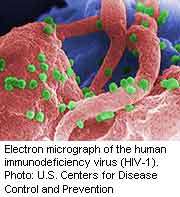Vaginal gel might prevent HIV hours after exposure

(HealthDay)—A new vaginal gel has the potential to protect women from HIV, even if it is applied several hours after sex, animal research suggests.
The antimicrobial gel protected five out of six monkeys from a hybrid simian/human AIDS virus when it was used three hours after exposure to the AIDS-causing virus, said lead author Walid Heneine, a researcher in HIV/AIDS prevention for the U.S. Centers for Disease Control and Prevention.
The same gel also protected two out of three monkeys when applied a half-hour before HIV exposure, according to the study, published March 12 in Science Translational Medicine.
Such a gel could be extremely useful in protecting women from HIV, because it can provide protection either before or after sexual activity, said Rowena Johnston, vice president of research for amfAR, the Foundation for AIDS Research.
"If you're having sex that's in any way not anticipated, you might not have an opportunity to apply the microbicide before the sex happens," Johnston said. "In the heat of the moment, you might not always have time to say 'Stop, put everything on hold while I put this product in.'"
Don't expect the gel to be on the market anytime soon, however. Researchers are a few years away from human clinical trials, Heneine said, because they are working on improving the gel's effectiveness. And results of animal trials aren't necessarily replicated in humans.
The gel contains a 1-percent solution of the anti-HIV drug raltegravir (Isentress), and works by blocking the ability of the virus to integrate its DNA into the DNA of animal cells.
DNA integration is a crucial step in HIV infection but comes late in the infection process, typically more than six hours after exposure, the researchers found. Focusing preventive treatment on that specific step provides an hours-long window when people can take steps to protect themselves after exposure to HIV.
"It's really a very interesting leap," Johnston said. "If you do want something that would protect against HIV after exposure, then you want a drug that acts later on in the virus' life cycle."
Once the gel is applied, the HIV cannot transmit its DNA into cells, the researchers say.
"The DNA degrades and the cell does not become affected," Heneine said. Raltegravir has "been very effective in HIV treatment, and now we're looking at it in prevention," he added.
In the United States, the AIDS virus is mainly spread by having unprotected sex (sex without a condom) with someone infected with HIV, according to the U.S. Centers for Disease Control and Prevention.
Researchers first tested the gel's effectiveness pre-contact, by applying it to three monkeys who were exposed to HIV twice a week for seven weeks. By the end, two of the three remained HIV-free, compared with just one out of 10 monkeys in a group that received an inactive placebo gel.
The team then tested whether the gel could protect against HIV infection after exposure, using six monkeys exposed to HIV twice a week for two and a half months. By applying the gel three hours after exposure, researchers were able to protect five of the six monkeys from HIV infection. All four monkeys in the placebo group contracted HIV.
Such a gel, once through its clinical trials and approved, could become as widely used as birth control devices such as condoms and spermicidal gels, Johnston said.
"You can imagine this to be a useful product to have, if it were something you could buy over the counter and have at home just in case," she said.
More information: For more information on HIV prevention, visit the U.S. Centers for Disease Control and Prevention.
Copyright © 2014 HealthDay. All rights reserved.

















